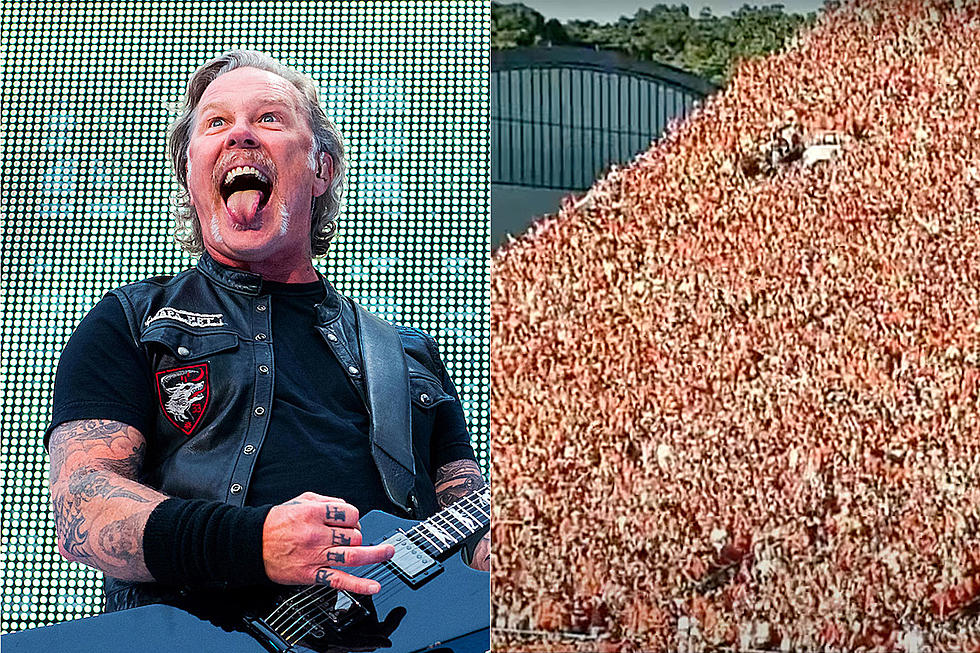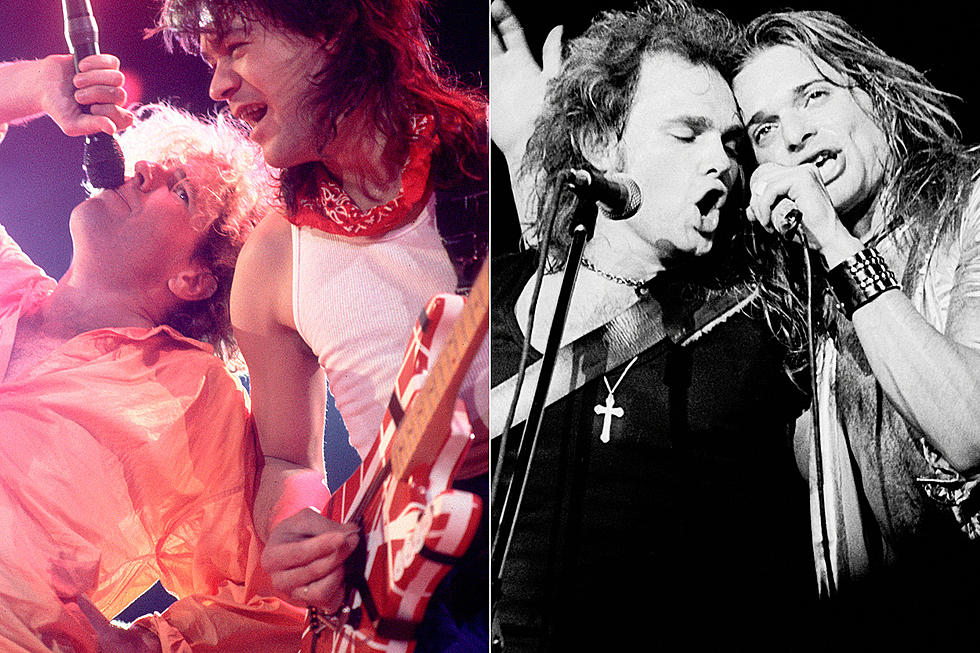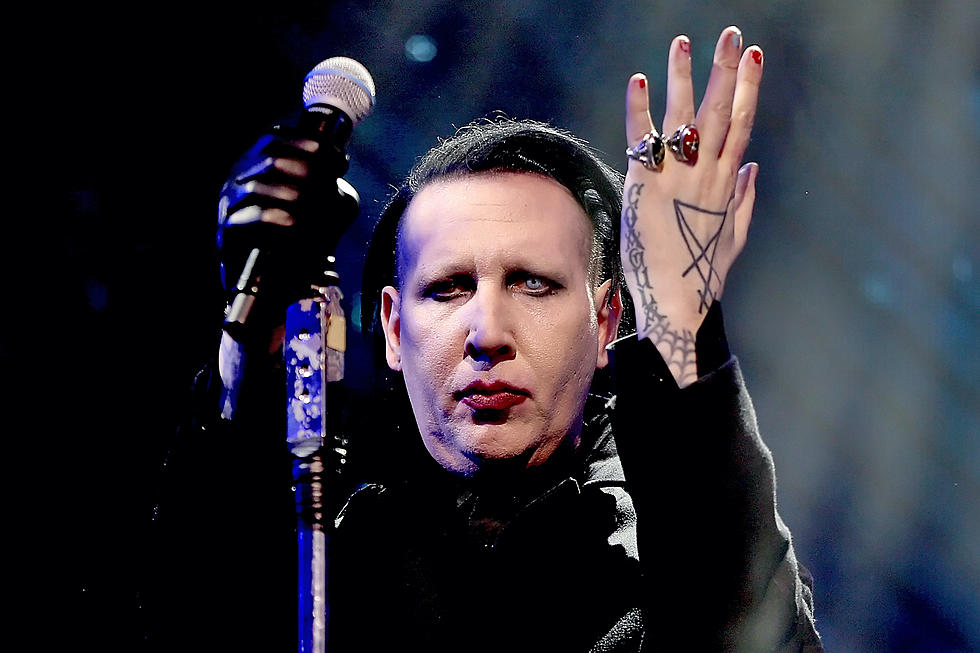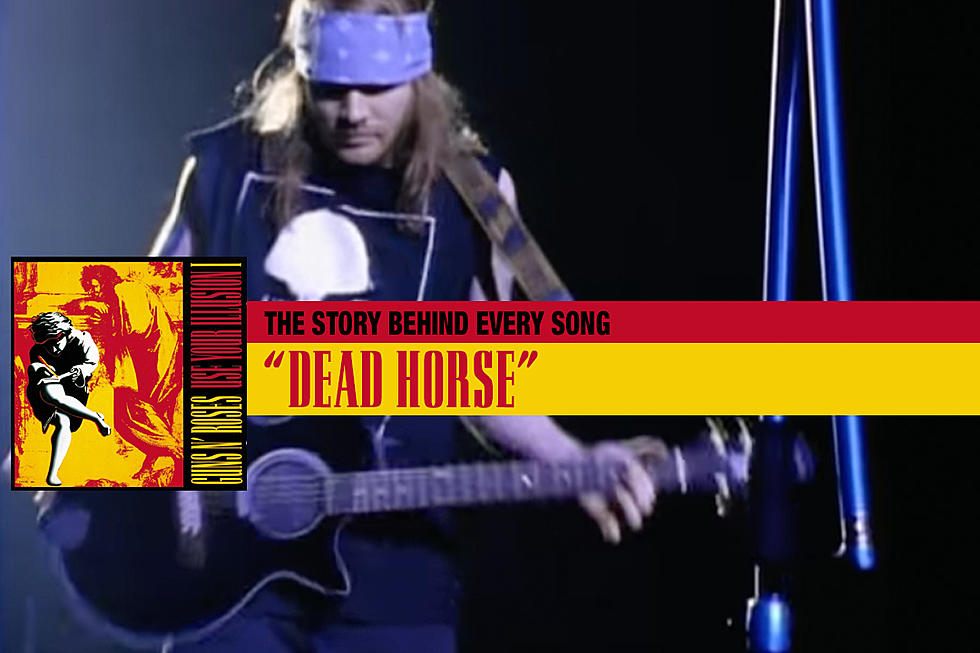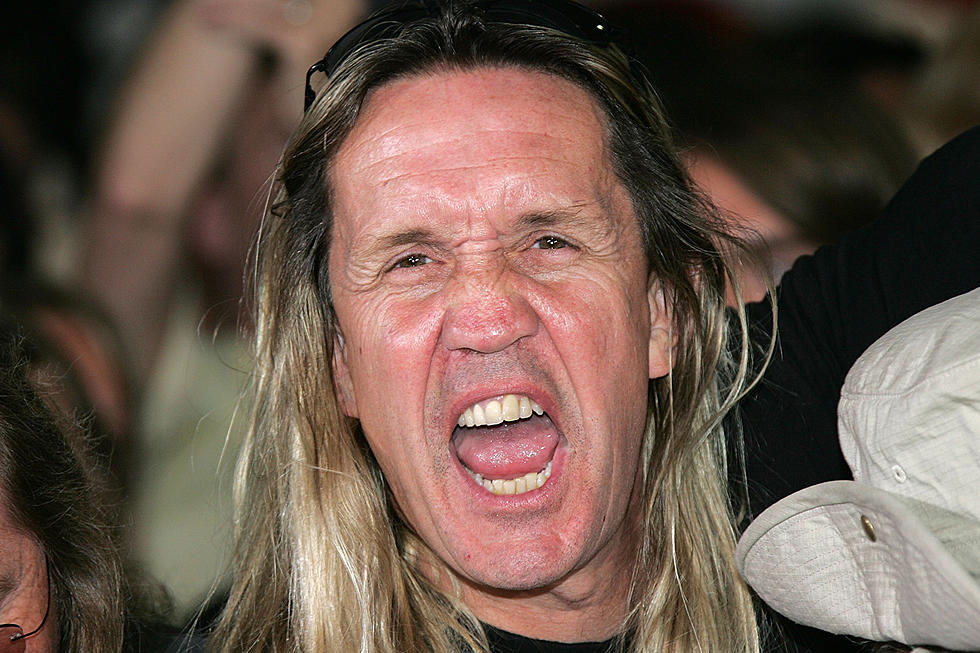
Nicko McBrain Explains Why Iron Maiden Need Such Long Songs
You'd be hard-pressed to find a bigger fan of Iron Maiden's new album Senjutsu than Nicko McBrain.
"Without a doubt a masterpiece," the 69-year-old drummer enthuses to UCR about his band's 17th album, the title of which translates loosely to "tactics and strategy." "I always say, 'It's the best thing we've ever made,' about our new records, because those new albums that you make are the best thing that you've ever made, you know? If it's not, then you're not gonna release it, are you? But this to me is definitely, I think, the best album we've ever made. And I know that's a stretch when you consider things like Seventh Son [of a Seventh Son] and my first album [Piece of Mind], Number of the Beast. But anyway, that's my personal opinion. I think Senjutsu is a masterpiece and our best work yet."
Clocking in at a hefty 82 minutes, Senjutsu marks Iron Maiden's second consecutive double album behind 2015's The Book of Souls. The English sextet once again partnered with longtime producer Kevin Shirley (with bassist Steve Harris coproducing) and recorded the album at Studio Guillaume Tell in Paris, where they also made The Book of Souls and 2000's Brave New World, which saw the return of singer Bruce Dickinson and guitarist Adrian Smith.
The result is a sprawling, adventurous album that employs all the Maiden hallmarks — swashbuckling guitar riffs, galloping rhythms, Dickinson's banshee wail — while introducing new elements to the band's time-honored sound, such as the monstrous, tribal drums on the title track, which McBrain says were inspired by the Japanese taiko drums used in warfare centuries ago. The last three songs on the album — "Death of the Celts," "The Parchment" and "Hell on Earth," all Harris solo compositions — add up to a staggering 34 minutes, a wildly ambitious triptych even by Maiden's standards.
McBrain spoke to UCR about keeping Iron Maiden's sound fresh, his drumming philosophy and the strategy behind all those 10-plus-minute epics.
On constantly adding new shades to the Iron Maiden sound
"Twenty years ago when Bruce and Ade came back was when Kevin Shirley jumped on board, and we went to the same studio where we recorded this album. And I think that because we went back there for three albums, we didn't consciously think, 'Well, let's go for this sound or that sound.' It just kind of generically made its way to the surface. And I say 'generically' because it's the band, the six of us, still making the music. A lot of the tracks, we've got below the vocal melody — and I don't think we've done this very often in the past — we've got a guitar line that's phrasing the vocal line. And there's three or four songs on the album where we do that, and I think that was something that Steve took and went, 'Oh, that works really well so we'll do that.' I don't recall many of our songs in the past having the guitar line underneath the vocal — on the lead vocal, not on a harmony or a chorus, actually along the verses. So there's a first, kind of a different thing that we used. It just came that way.
"Every time we go in the studio, we never know what's gonna happen. Sometimes the songs aren't written. Sometimes there's only one or two ideas written, and Steve will go away with an idea or two from either Janick [Gers] or Adrian, or Bruce and Adrian, and Davey [Murray] occasionally comes along with a chestnut or two. So then Steve will go and lock himself away, and the pressure’s on the writers, most definitely. And this album just had a natural, dare I say, reverence to it. I mean that in the sense that when we were in that room, we were totally comfortable. It was like putting on an old pair of slippers or your favorite gloves and a pair of favorite jeans, that sort of thing. We were comfortable."
On dialing in the perfect tones for every song
"Whether our fans, the grumblers, the up-and-coming studio engineers, all the people that think that they know what sonically takes place in the studio, these experts: Okay, you can work it all out for yourself, but Kevin and Steve, I think, have surpassed themselves. They put an awful lot of work into getting the sonics of this album working. Each track is different. This is what I love about this album. Some of the earlier albums, we got the drum sound up, and we just went with it on each track. Maybe a little bit of reverb on the snare and a bit more of the room, but it was basically the same kind of sound. And they've [found different sounds] with all the instruments on this album. Steve's bass is a couple of different tones, and I love that. That took a lot of time, and they did a fantastic job. And of course, don't get me started on the performances. Bruce's vocals, I mean, he's tracking harmonies that are just out of this world, off the charts. The guitar solos — I mean, just take the two guitar solos on 'The Writing on the Wall.' You get Dave Murray coming up with these real bluesy, licky, Paul Kossoff kind of guitar lines and his beautiful, melodic solo that only Davey plays like that. Janick's similar, but David Murray's got a certain feel. And then, of course, you get blown away with Adrian's solo. And then, of course, it opens up the rest of the album. My favorite track, 'The Parchment,' look at the solos. All of my bandmates are just off the charts.
"You’re getting a vibe, boys and girls, aren’t you, that I do like this album!"
Watch the Video for Iron Maiden's 'The Writing on the Wall'
On the necessity (and method) of long songs
"We were sitting back in the control room, and I think it might have even been "The Parchment" — it's either that or 'The Time Machine,' one of those — and Kevin says, 'Do you realize these songs are over 12 minutes long?' And we were all sitting in the room [and said], 'Nah, there’s no way that's 12 minutes. There's no way that song could be that long. And by the way, what's your point?' [Laughs] When people sit down and they've got the time sheet, they look at the time the track is, and maybe they will listen to the track without the lyrics written down, and they might have a short attention span. They go, 'When’s the next change?' Well, there’s always a method to the structures. Nine times out of 10, you'll find the repeat is four times, or it might even be eight. And in the case of the three guitar players, each guitar player needs to have a solo. You can't write a song and go, 'Right, only Davey’s gonna do the solo,' or only Ade or only Janick. Not that any of the other two would complain. They’d probably go, 'Great, less work for me!'
"This is another thing in this band: None of these guys have got an ego where they say, 'Well, I wrote the song, I’m gonna do [the solo].' Take, for instance, again, that classic 'Writing on the Wall.' Davey Murray does the first solo, Adrian does the second. Adrian wrote the song with Bruce. We said, 'Well, do you want to take the first solo?' And Ade says, 'No, I prefer to do the second one, actually. Dave, do you want to do it?' And then the three of them — the three amigos — they go and talk about it. The rest of us don’t really have a say in it. And then Harry will sit there and go, 'Well, whatever you want to do is good with me.'"
On keeping an analog mindset in a Pro Tools era
"We're an old-school band. We’ve always said we want to capture our sound and we want to capture our performance as a live performance. But when you think about recording, that's what it is anyway. It's nothing but a live performance. But the thinking behind that is we wanted to play it like a live song. You can't start a song and end up halfway and then go, 'Well, we're gonna have a cup of tea now, we're gonna play the next bit in a minute.' In the old days of analog ... whatever made the engineer so super-duper was how he could splice out one beat or one note of a two-inch tape. And then they started to multitrack multitracks. You know, the editing process was retardedly hard. So with Pro Tools and all this, you can move stuff, you can pitch-tune, or what is it they call that, pitch detective? We don't go for that. We never have done [that], but the beautiful thing about being able to record today is we've gotten used to the technology. It's been around for like, what, 20, 30 years now, at least since we went to Guillaume Tell in Paris on the Brave New World album. So we utilize the technology that's available to us.
"But when we do a song in bits, what we do is when we've got the first part, we'll play back the last four or eight bars, and we do it like a drop-in, like you would if you were doing it on analog tape. This is how you used to drop in on analog, and you’d have to get the timing right there, press the record button for the drop-in. So we still do it like that. So even when we're in the studio, we don't just go, 'Right, okay, let's start the second bit now.' Push, off we go."
On the mountain of Senjutsu session outtakes
"Kevin had 64 hard drives, and they were running all the time, even for the rehearsals. It's gonna be interesting, actually, to go back and have a listen to some of that stuff. Listen to all the curse words! And, 'Oh, I messed up again! Oh, you messed up there! Why are you ... !' You know, the little arguments that take place."
On whether Iron Maiden will play Senjutsu in full on tour
"I don't know. At the moment we're only concentrating on the Legacy [of the Beast] tour, which, as you know, was postponed from last year. We're hoping to go out next year in June. So, any future plans, they're under lock and key like the album was for two years. So, no, I can honestly say we have not discussed a Senjutsu tour. We're only discussing the Legacy, and making sure everybody's safe and being able to get out and do that."
Iron Maiden Albums Ranked
More From 106.3 The Buzz

